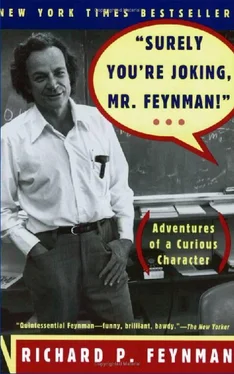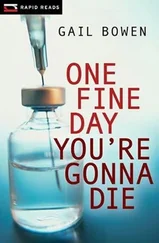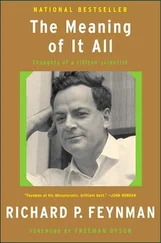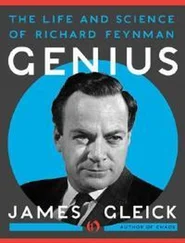This question of trying to figure out whether a book is good or bad by looking at it carefully or by taking the reports of a lot of people who looked at it carelessly is like this famous old problem: Nobody was permitted to see the Emperor of China, and the question was, What is the length of the Emperor of China’s nose? To find out, you go all over the country asking people what they think the length of the Emperor of China’s nose is, and you average it. And that would be very “accurate” because you averaged so many people. But it’s no way to find anything out; when you have a very wide range of people who contribute without looking carefully at it, you don’t improve your knowledge of the situation by averaging.
At first we weren’t supposed to talk about the cost of the books. We were told how many books we could choose, so we designed a program which used a lot of supplementary books, because all the new textbooks had failures of one kind or another. The most serious failures were in the “new math” books: there were no applications; not enough word problems. There was no talk of selling stamps; instead there was too much talk about commutation and abstract things and not enough translation to situations in the world. What do you do: add, subtract, multiply, or divide? So we suggested some books which had some of that as supplementary—one or two for each classroom—in addition to a textbook for each student. We had it all worked out to balance everything, after much discussion.
When we took our recommendations to the Board of Education, they told us they didn’t have as much money as they had thought, so we’d have to go over the whole thing and cut out this and that, now taking the cost into consideration, and ruining what was a fairly balanced program, in which there was a chance for a teacher to find examples of the things (s)he needed.
Now that they changed the rules about how many books we could recommend and we had no more chance to balance, it was a pretty lousy program. When the senate budget committee got to it, the program was emasculated still further. Now it was really lousy! I was asked to appear before the state senators when the issue was being discussed, but I declined: By that time, having argued this stuff so much, I was tired. We had prepared our recommendations for the Board of Education, and I figured it was their job to present it to the state—which was legally right, but not politically sound. I shouldn’t have given up so soon, but to have worked so hard and discussed so much about all these books to make a fairly balanced program, and then to have the whole thing scrapped at the end—that was discouraging! The whole thing was an unnecessary effort that could have been turned around and done the opposite way: start with the cost of the books, and buy what you can afford.
What finally clinched it, and made me ultimately resign, was that the following year we were going to discuss science books. I thought maybe the science would be different, so I looked at a few of them.
The same thing happened: something would look good at first and then turn out to be horrifying. For example, there was a book that started out with four pictures: first there was a wind-up toy; then there was an automobile; then there was a boy riding a bicycle; then there was something else. And underneath each picture it said, “What makes it go?”
I thought, “I know what it is: They’re going to talk about mechanics, how the springs work inside the toy; about chemistry, how the engine of the automobile works; and biology, about how the muscles work.”
It was the kind of thing my father would have talked about: “What makes it go? Everything goes because the sun is shining.” And then we would have fun discussing it:
“No, the toy goes because the spring is wound up,” I would say.
“How did the spring get wound up?” he would ask.
“I wound it up.”
“And how did you get moving?”
“From eating.”
“And food grows only because the sun is shining. So it’s because the sun is shining that all these things are moving.” That would get the concept across that motion is simply the transformation of the sun’s power.
I turned the page. The answer was, for the wind-up toy, “Energy makes it go.” And for the boy on the bicycle, “Energy makes it go.” For everything, “ Energy makes it go.”
Now that doesn’t mean anything. Suppose it’s “Wakalixes.” That’s the general principle: “Wakalixes makes it go.” There’s no knowledge coming in. The child doesn’t learn anything; it’s just a word!
What they should have done is to look at the wind-up toy, see that there are springs inside, learn about springs, learn about wheels, and never mind “energy.” Later on, when the children know something about how the toy actually works, they can discuss the more general principles of energy.
It’s also not even true that “energy makes it go,” because if it stops, you could say, “energy makes it stop” just as well, What they’re talking about is concentrated energy being transformed into more dilute forms, which is a very subtle aspect of energy. Energy is neither increased nor decreased in these examples; it’s just changed from one form to another. And when the things stop, the energy is changed into heat, into general chaos.
But that’s the way all the books were: They said things that were useless, mixed-up, ambiguous, confusing, and partially incorrect. How anybody can learn science from these books, I don’t know, because it’s not science.
So when I saw all these horrifying books with the same kind of trouble as the math books had, I saw my volcano process starting again. Since I was exhausted from reading all the math books, and discouraged from its all being a wasted effort, I couldn’t face another year of that, and had to resign.
Sometime later I heard that the energy-makes-it-go book was going to be recommended by the curriculum commission to the Board of Education, so I made one last effort. At each meeting of the commission the public was allowed to make comments, so I got up and said why I thought the book was bad.
The man who replaced me on the commission said, “That book was approved by sixty-five engineers at the Such-and-such Aircraft Company!”
I didn’t doubt that the company had some pretty good engineers, but to take sixty-five engineers is to take a wide range of ability—and to necessarily include some pretty poor guys! It was once again the problem of averaging the length of the emperor’s nose, or the ratings on a book with nothing between the covers. It would have been far better to have the company decide who their better engineers were, and to have them look at the book. I couldn’t claim that I was smarter than sixty-five other guys—but the average of sixty five other guys, certainly!
I couldn’t get through to him, and the book was approved by the board.
When I was still on the commission, I had to go to San Francisco a few times for some of the meetings, and when I returned to Los Angeles from the first trip, I stopped in the commission office to get reimbursed for my expenses.
“How much did it cost, Mr. Feynman?”
“Well, I flew to San Francisco, so it’s the airfare, plus the parking at the airport while I was away.”
“Do you have your ticket?”
I happened to have the ticket.
“Do you have a receipt for the parking?”
“No, but it cost $2.35 to park my car.”
“But we have to have a receipt.”
“I told you how much it cost. If you don’t trust me, why do you let me tell you what I think is good and bad about the schoolbooks?”
Читать дальше












